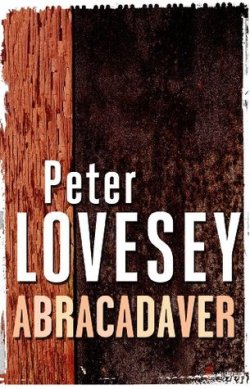 The music halls of Victorian London are being plagued by “accidents” – a shortened trapeze rope, mustard on a sword-swallower’s sword, the replacement of the lyrics for a sing-a-long with naughtier words… it’s only a matter of time before things actually turn nasty.
The music halls of Victorian London are being plagued by “accidents” – a shortened trapeze rope, mustard on a sword-swallower’s sword, the replacement of the lyrics for a sing-a-long with naughtier words… it’s only a matter of time before things actually turn nasty.
Enter Sergeant Cribb and Constable Thackerey. The incidents have already caught Cribb’s eye and when he gets a tip-off, he heads to the theatre to witness a disaster involving a strongman and a bulldog. With seemingly no rhyme or reason behind the incidents, why are the victims disappearing off the face of the earth? Why is Cribb so intrigued by the case? And is anyone actually going to get murdered? Note: one of these questions won’t get answered.
First off, thanks for all the kind comments on the last post. There seems to be a vague improvement – fingers crossed – and I’ve managed, most importantly, to get some reading done. So what about the wonderfully named Abracadaver?
I understand the need for writers not the write the same book twice. I know that Michael Jecks makes an effort to alter the style of his plotting from book to book, for example, but Peter Lovesey’s changes are much more pronounced. Sometimes they work. Sometimes they don’t. For example, the structure of Upon A Dark Night is very different from what one would expect from a series novel, but it works so well. Stagestruck takes a whodunit but has a bonkers master-plan from a character who resembles a super-villain (in plotting at least). And it works very well. But here…
The Cribb books are an odd bunch. Wobble To Death and A Case Of Spirits are very much clever whodunits, detailing aspects of Victorian life (marathon-walking and spiritualism) in well-researched detail, but The Detective Wore Silk Drawers suffered from the detail taking over (and the fact that I couldn’t give two hoots about bare-knuckle fighting). Here, it seems that Lovesey is more interested in the Victorian music-hall for a chunk of the book. In fact, it’s a book of two halves – what is happening to the acts and (very much later) who killed someone (who I won’t name as it happens well past the halfway mark). And neither bit really gripped me.
The idea of what’s happening is pretty obvious, although given the level of disgrace attached to some of the acts’ accidents, I’m not sure why it would work. The murder is a bit more interesting but anyone who falls for the trick at the end… Maybe I’m being harsh – a number of Goodreads readers praise the ending but it couldn’t have been more obvious to me by the final chapter if the murderer had been wearing an “I DID IT” T-shirt. And why exactly is Cribb so interested in this case? Surely there must have been some proper murders to investigate – Victorian London was full of them according to Ripper Street.
I’ll admit – the book probably suffers from being read after two absolute crackers – The Herald Of Hell and Chef Maurice 3 (review coming when it’s published). But even so… it’s a bit of a waste of a cracking title. Fingers crossed for the next Sergeant Cribb book, although apparently that one takes a while to get going too. Maybe it’s back to Peter Diamond next time…
And on an vaguely related note – this one is set in the Victorian music halls and the previous book featured a character called Henry Jago. Was Robert Holmes a fan? [Note: If you’re not a Doctor Who fan(atic), you really won’t understand that bit. Sorry.]

‘Dingers crossed’? Oh dear, you really are suffering chum! Its been decades since I read this one but sorry it don’t work for you but you are certainly right as Lovesey has used a variety of styles, and I’ve not felt that all of them really succeeded as well outside of the traditional whodunit formula (much as it pains me to say that as I like his work a lot).
LikeLike
You could have selected Swing, Swing Together which would have qualified for the Past Offences Crimes Of the Century meme 1976. 🙂
LikeLike
Reading them in order…
LikeLike
“Dingers crossed for the next Sergeant Cribb book…”
(The typographical mistake is not mine)
Well, in my opinion, the next book in the series is much worse !
LikeLike
What typo was that? I can’t see one 🙂
LikeLike
Well, your hand is quicker than your eye !
LikeLike
Oh what a shame because crime novels set in this period and it all sounded so intriguing and to not even enjoy the ending is just too sad!
LikeLike
I read this one when I was young and inexperienced and just discovering historical mysteries. I seemed to think quite highly of it then (my utterly inadequate book log from pre-blogging days gave it four stars–but I have nothing to let you know why….). I wonder what I would think of it now.
LikeLike
[…] Abracadaver by Peter Lovesey […]
LikeLike
[…] Best Title For A Rubbish Book: Abracadaver by Peter Lovesey. […]
LikeLike